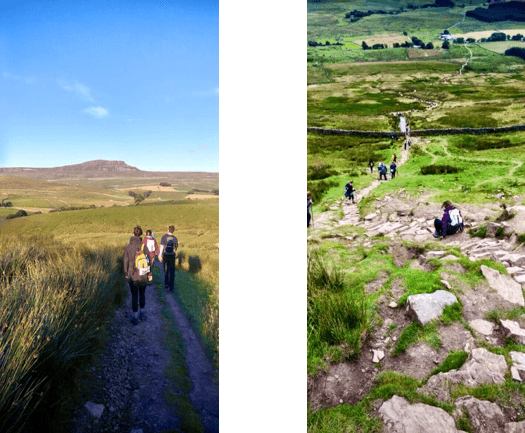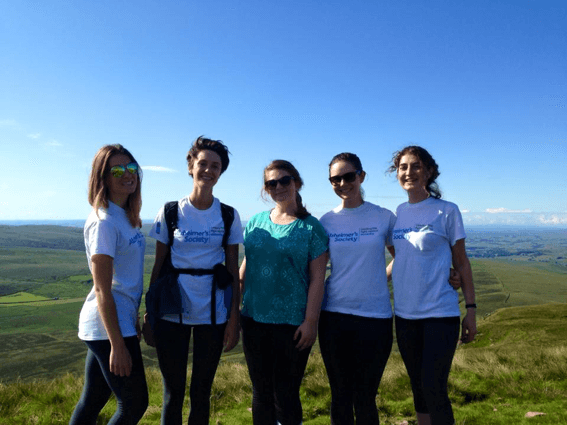Progress to Date
Dementia directly affects a bout 820,000 people in the UK with numbers increasing rapidly as the population ages. Our study team has learnt from previous research that agitation is extremely common in people with dementia and causes distress to themselves, family carers and paid carers; incurring significant costs and leading to the break down of relationships.
bout 820,000 people in the UK with numbers increasing rapidly as the population ages. Our study team has learnt from previous research that agitation is extremely common in people with dementia and causes distress to themselves, family carers and paid carers; incurring significant costs and leading to the break down of relationships.
The MARQUE Project is an ongoing five year long study currently taking place all over England, led by our research team at UCL.
MARQUE was funded in response to the government’s “Challenge on Dementia” in 2012(1). Professor Gill Livingston was awarded  over £3 million of funding by the ESRC and NIHR to conduct this study to increase knowledge about dementia, agitation and personhood with the ultimate aim of improving quality of life of people with dementia(2). Agitation has previously always been tackled at an individual level, but in this project, we aim to tackle agitation at an organizational level.
over £3 million of funding by the ESRC and NIHR to conduct this study to increase knowledge about dementia, agitation and personhood with the ultimate aim of improving quality of life of people with dementia(2). Agitation has previously always been tackled at an individual level, but in this project, we aim to tackle agitation at an organizational level.
There are 6 streams of MARQUE. Please see www.ucl.ac.uk/psychiatry/marque for full details of these streams. Below is an update of where we are at.
Stream 1 – Theoretical understanding of personhood and agitation
The conceptual stream of MARQUE is active. Professor Paul Higgs is conducting a theoretical investigation into the concepts of person and personhood and their application to care practises for people with dementia.
Stream 2 – Longitudinal study of agitation, quality of life and coping strategies in care homes.
 This stream has been active since April 2014 when recruitment began.
This stream has been active since April 2014 when recruitment began.
We have made fantastic recruitment progress to date:
We have recruited 97 care home clusters nationally – the map to the right shows the spread of our recruitment nationally.
We currently have 4193 people consented to the study:
- 1649 staff
- 1456 residents
- 1088 relatives
Stream 3 – Development and testing of intervention in care homes
We are in the process of finalising a manual based training programme for care staff to test in a randomised control study with 20 care homes.
The manual has been developed based on the our previous systematic review of non pharmacological interventions in dementia (Livingston et al 2014), the START manual(3) for family carers and has been informed by multiple interviews with care homes staff about the barriers and facilitators of managing agitation in care homes.
We plan to begin piloting the intervention in one care home in January 2016.
Research Assistants are currently being trained to deliver the intervention to start mid 2016.
Stream 4 – Qualitative exploration of agitation and family carers coping at home.
Recruitment is active and 5 family carers have been interviewed so far.
Stream 5 – End of life and agitation: Ethnographic study of people with dementia, families and paid carers.
Recruitment is active and 4 full observations of agitation at the end of life in hospital have been completed so far.
Stream 6 – Pilot intervention at end of life
Stream 6 is planned to start following the completion of stream 5.
Ongoing PhD projects attached to MARQUE:
Quality of life: a comparison of the perspectives of paid staff, family relatives and individual’s with dementia in care homes.
 Sarah Robertson:
Sarah Robertson:
This PhD is embedded into Stream 2 and compares and explores the perspectives of paid staff, family relatives and people with dementia in a care home setting. I am exploring these perspectives qualitatively and quantitatively to build a conceptual model of quality of life in this context. Supervisors: Prof Gill Livingston, Dr Claudia Cooper, Dr Juanita Hoe.
A longitudinal study exploring the prescription and administration of analgesic and psychotropic medication in UK care home residents with dementia
 Francesca La Frenais
Francesca La Frenais
A prospective study embedded into Stream 2 exploring medication use in residents with dementia in UK care homes. The primary objective investigates whether taking a higher dose of analgesic medication means that a resident will receive more or less psychotropic medication. Supervisors: Dr Liz Sampson, Prof Paddy Stone, MCPCRD, and Prof Carmel Hughes, Queen’s University Belfast).
Development of an evidence based intervention to improve agitation for people with dementia in care homes
 Dr Penny Rapaport
Dr Penny Rapaport
This PhD is embedded within Stream 3. The PhD will explore and describe: staff understanding of agitation; the barriers and facilitators to psychosocial intervention through staff training; the contributors to “care home culture” and what can facilitate a shift in these factors. This exploratory work will inform the development and piloting of the intervention. Supervisors: Prof Gill Livingston, Dr Claudia Cooper.
Written by Sarah Robertson, PhD Student & Research Assistant on the MARQUE Project.
Email: sarah.robertson@ucl.ac.uk
Twitter: @1SarahMae
References
- https://www.gov.uk/government/publications/prime-ministers-challenge-on-dementia
- https://www.ucl.ac.uk/ion/articles/news/20150223
- http://www.ucl.ac.uk/psychiatry/start/
 A study by Dr Claudia Cooper (UCL Psychiatry) found that dementia patients in England’s poorest areas are 27 per cent less likely to be prescribed anti-dementia drugs than those in richer places. Read more in the Sun.
A study by Dr Claudia Cooper (UCL Psychiatry) found that dementia patients in England’s poorest areas are 27 per cent less likely to be prescribed anti-dementia drugs than those in richer places. Read more in the Sun. Close
Close



 Dr Michael Bloomfield is an Academic Clinical Fellow at the Medical Research Council and University College London. In 2014 he completed his PhD thesis and passed his MRCPsych examination. He published six papers. He won several awards, including the British Association of Psychopharmacology’s Junior Clinical Psychopharmacologist prize. A lecture of his was viewed over 11,000 times on YouTube. He has contributed to BBC Radio 4’s Today programme as well as a number of broadsheets on topics related to Psychiatry.
Dr Michael Bloomfield is an Academic Clinical Fellow at the Medical Research Council and University College London. In 2014 he completed his PhD thesis and passed his MRCPsych examination. He published six papers. He won several awards, including the British Association of Psychopharmacology’s Junior Clinical Psychopharmacologist prize. A lecture of his was viewed over 11,000 times on YouTube. He has contributed to BBC Radio 4’s Today programme as well as a number of broadsheets on topics related to Psychiatry.








